BTEC RQF Organisational Behaviour: Key Influences and Performance
VerifiedAdded on 2023/06/16
|13
|4485
|388
Report
AI Summary
This report provides a comprehensive analysis of organizational behavior, focusing on the impact of workplace culture, power dynamics, and motivational theories on individual and team performance. It examines Handy's model of organizational culture, discussing power culture, task culture, role culture, and person culture, and their respective effects. The report also explores the negative impacts of workplace politics and the various types of power (legitimate, rewards, coercive, expert, and referent) and their influence on employee behavior. Furthermore, it delves into content and process theories of motivation, including Maslow's hierarchy of needs and Skinner's reinforcement theory, illustrating how these theories can be applied to enhance employee motivation and goal accomplishment within organizations like Sainsbury. Desklib offers this assignment as a resource for students studying organizational behavior, alongside a wealth of other solved assignments and past papers.
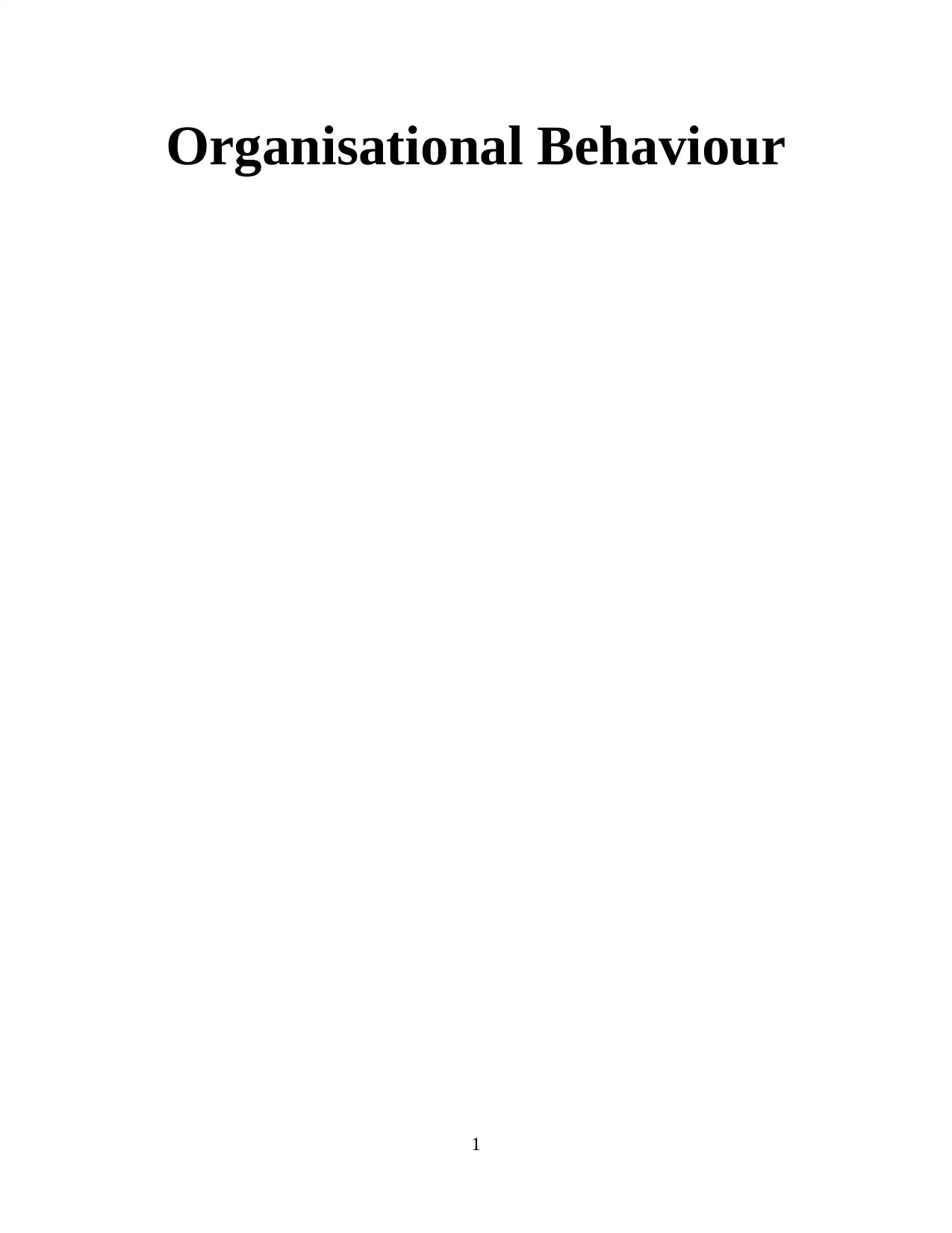
Organisational Behaviour
1
1
Paraphrase This Document
Need a fresh take? Get an instant paraphrase of this document with our AI Paraphraser
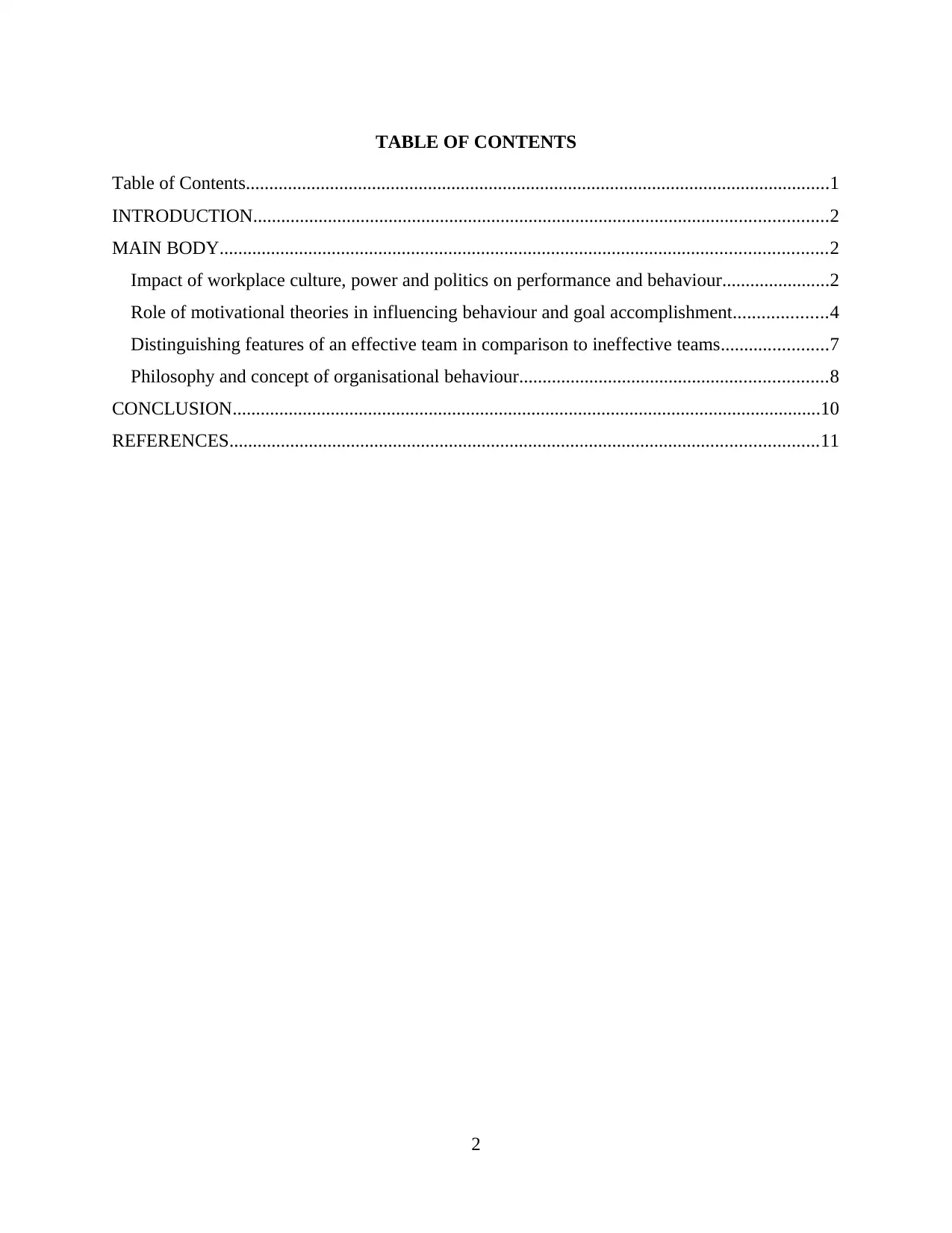
TABLE OF CONTENTS
Table of Contents.............................................................................................................................1
INTRODUCTION...........................................................................................................................2
MAIN BODY..................................................................................................................................2
Impact of workplace culture, power and politics on performance and behaviour.......................2
Role of motivational theories in influencing behaviour and goal accomplishment....................4
Distinguishing features of an effective team in comparison to ineffective teams.......................7
Philosophy and concept of organisational behaviour..................................................................8
CONCLUSION..............................................................................................................................10
REFERENCES..............................................................................................................................11
2
Table of Contents.............................................................................................................................1
INTRODUCTION...........................................................................................................................2
MAIN BODY..................................................................................................................................2
Impact of workplace culture, power and politics on performance and behaviour.......................2
Role of motivational theories in influencing behaviour and goal accomplishment....................4
Distinguishing features of an effective team in comparison to ineffective teams.......................7
Philosophy and concept of organisational behaviour..................................................................8
CONCLUSION..............................................................................................................................10
REFERENCES..............................................................................................................................11
2
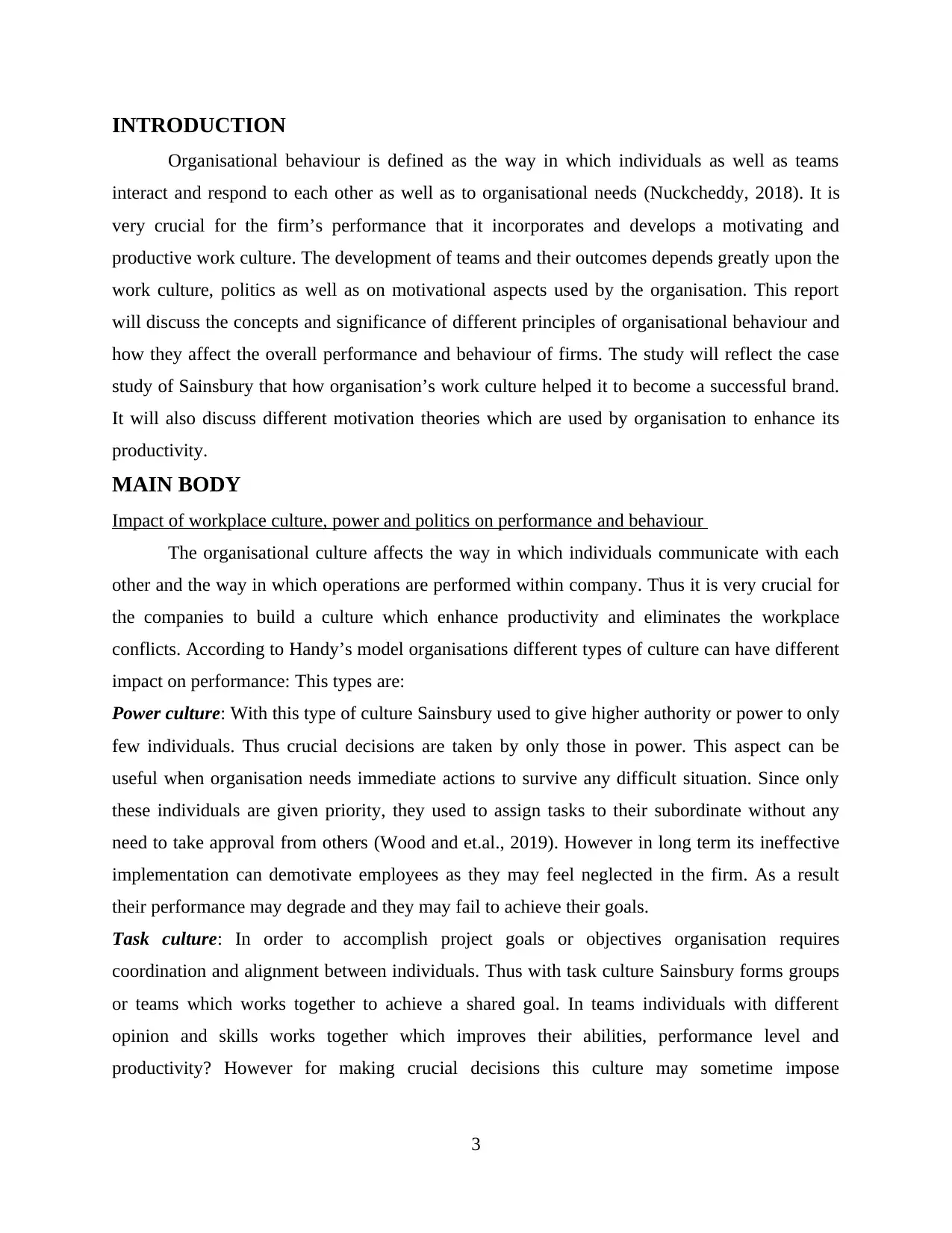
INTRODUCTION
Organisational behaviour is defined as the way in which individuals as well as teams
interact and respond to each other as well as to organisational needs (Nuckcheddy, 2018). It is
very crucial for the firm’s performance that it incorporates and develops a motivating and
productive work culture. The development of teams and their outcomes depends greatly upon the
work culture, politics as well as on motivational aspects used by the organisation. This report
will discuss the concepts and significance of different principles of organisational behaviour and
how they affect the overall performance and behaviour of firms. The study will reflect the case
study of Sainsbury that how organisation’s work culture helped it to become a successful brand.
It will also discuss different motivation theories which are used by organisation to enhance its
productivity.
MAIN BODY
Impact of workplace culture, power and politics on performance and behaviour
The organisational culture affects the way in which individuals communicate with each
other and the way in which operations are performed within company. Thus it is very crucial for
the companies to build a culture which enhance productivity and eliminates the workplace
conflicts. According to Handy’s model organisations different types of culture can have different
impact on performance: This types are:
Power culture: With this type of culture Sainsbury used to give higher authority or power to only
few individuals. Thus crucial decisions are taken by only those in power. This aspect can be
useful when organisation needs immediate actions to survive any difficult situation. Since only
these individuals are given priority, they used to assign tasks to their subordinate without any
need to take approval from others (Wood and et.al., 2019). However in long term its ineffective
implementation can demotivate employees as they may feel neglected in the firm. As a result
their performance may degrade and they may fail to achieve their goals.
Task culture: In order to accomplish project goals or objectives organisation requires
coordination and alignment between individuals. Thus with task culture Sainsbury forms groups
or teams which works together to achieve a shared goal. In teams individuals with different
opinion and skills works together which improves their abilities, performance level and
productivity? However for making crucial decisions this culture may sometime impose
3
Organisational behaviour is defined as the way in which individuals as well as teams
interact and respond to each other as well as to organisational needs (Nuckcheddy, 2018). It is
very crucial for the firm’s performance that it incorporates and develops a motivating and
productive work culture. The development of teams and their outcomes depends greatly upon the
work culture, politics as well as on motivational aspects used by the organisation. This report
will discuss the concepts and significance of different principles of organisational behaviour and
how they affect the overall performance and behaviour of firms. The study will reflect the case
study of Sainsbury that how organisation’s work culture helped it to become a successful brand.
It will also discuss different motivation theories which are used by organisation to enhance its
productivity.
MAIN BODY
Impact of workplace culture, power and politics on performance and behaviour
The organisational culture affects the way in which individuals communicate with each
other and the way in which operations are performed within company. Thus it is very crucial for
the companies to build a culture which enhance productivity and eliminates the workplace
conflicts. According to Handy’s model organisations different types of culture can have different
impact on performance: This types are:
Power culture: With this type of culture Sainsbury used to give higher authority or power to only
few individuals. Thus crucial decisions are taken by only those in power. This aspect can be
useful when organisation needs immediate actions to survive any difficult situation. Since only
these individuals are given priority, they used to assign tasks to their subordinate without any
need to take approval from others (Wood and et.al., 2019). However in long term its ineffective
implementation can demotivate employees as they may feel neglected in the firm. As a result
their performance may degrade and they may fail to achieve their goals.
Task culture: In order to accomplish project goals or objectives organisation requires
coordination and alignment between individuals. Thus with task culture Sainsbury forms groups
or teams which works together to achieve a shared goal. In teams individuals with different
opinion and skills works together which improves their abilities, performance level and
productivity? However for making crucial decisions this culture may sometime impose
3
⊘ This is a preview!⊘
Do you want full access?
Subscribe today to unlock all pages.

Trusted by 1+ million students worldwide
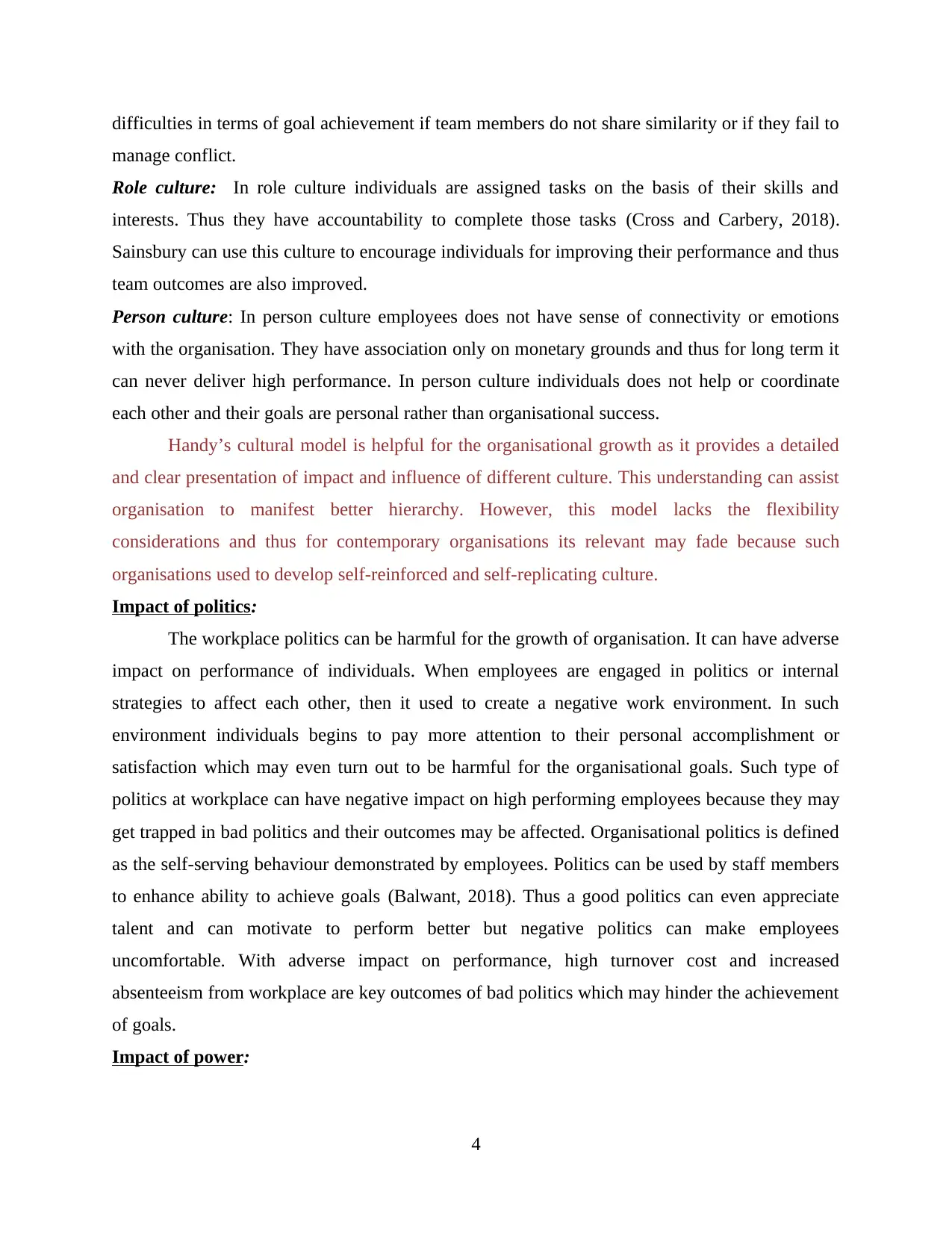
difficulties in terms of goal achievement if team members do not share similarity or if they fail to
manage conflict.
Role culture: In role culture individuals are assigned tasks on the basis of their skills and
interests. Thus they have accountability to complete those tasks (Cross and Carbery, 2018).
Sainsbury can use this culture to encourage individuals for improving their performance and thus
team outcomes are also improved.
Person culture: In person culture employees does not have sense of connectivity or emotions
with the organisation. They have association only on monetary grounds and thus for long term it
can never deliver high performance. In person culture individuals does not help or coordinate
each other and their goals are personal rather than organisational success.
Handy’s cultural model is helpful for the organisational growth as it provides a detailed
and clear presentation of impact and influence of different culture. This understanding can assist
organisation to manifest better hierarchy. However, this model lacks the flexibility
considerations and thus for contemporary organisations its relevant may fade because such
organisations used to develop self-reinforced and self-replicating culture.
Impact of politics:
The workplace politics can be harmful for the growth of organisation. It can have adverse
impact on performance of individuals. When employees are engaged in politics or internal
strategies to affect each other, then it used to create a negative work environment. In such
environment individuals begins to pay more attention to their personal accomplishment or
satisfaction which may even turn out to be harmful for the organisational goals. Such type of
politics at workplace can have negative impact on high performing employees because they may
get trapped in bad politics and their outcomes may be affected. Organisational politics is defined
as the self-serving behaviour demonstrated by employees. Politics can be used by staff members
to enhance ability to achieve goals (Balwant, 2018). Thus a good politics can even appreciate
talent and can motivate to perform better but negative politics can make employees
uncomfortable. With adverse impact on performance, high turnover cost and increased
absenteeism from workplace are key outcomes of bad politics which may hinder the achievement
of goals.
Impact of power:
4
manage conflict.
Role culture: In role culture individuals are assigned tasks on the basis of their skills and
interests. Thus they have accountability to complete those tasks (Cross and Carbery, 2018).
Sainsbury can use this culture to encourage individuals for improving their performance and thus
team outcomes are also improved.
Person culture: In person culture employees does not have sense of connectivity or emotions
with the organisation. They have association only on monetary grounds and thus for long term it
can never deliver high performance. In person culture individuals does not help or coordinate
each other and their goals are personal rather than organisational success.
Handy’s cultural model is helpful for the organisational growth as it provides a detailed
and clear presentation of impact and influence of different culture. This understanding can assist
organisation to manifest better hierarchy. However, this model lacks the flexibility
considerations and thus for contemporary organisations its relevant may fade because such
organisations used to develop self-reinforced and self-replicating culture.
Impact of politics:
The workplace politics can be harmful for the growth of organisation. It can have adverse
impact on performance of individuals. When employees are engaged in politics or internal
strategies to affect each other, then it used to create a negative work environment. In such
environment individuals begins to pay more attention to their personal accomplishment or
satisfaction which may even turn out to be harmful for the organisational goals. Such type of
politics at workplace can have negative impact on high performing employees because they may
get trapped in bad politics and their outcomes may be affected. Organisational politics is defined
as the self-serving behaviour demonstrated by employees. Politics can be used by staff members
to enhance ability to achieve goals (Balwant, 2018). Thus a good politics can even appreciate
talent and can motivate to perform better but negative politics can make employees
uncomfortable. With adverse impact on performance, high turnover cost and increased
absenteeism from workplace are key outcomes of bad politics which may hinder the achievement
of goals.
Impact of power:
4
Paraphrase This Document
Need a fresh take? Get an instant paraphrase of this document with our AI Paraphraser
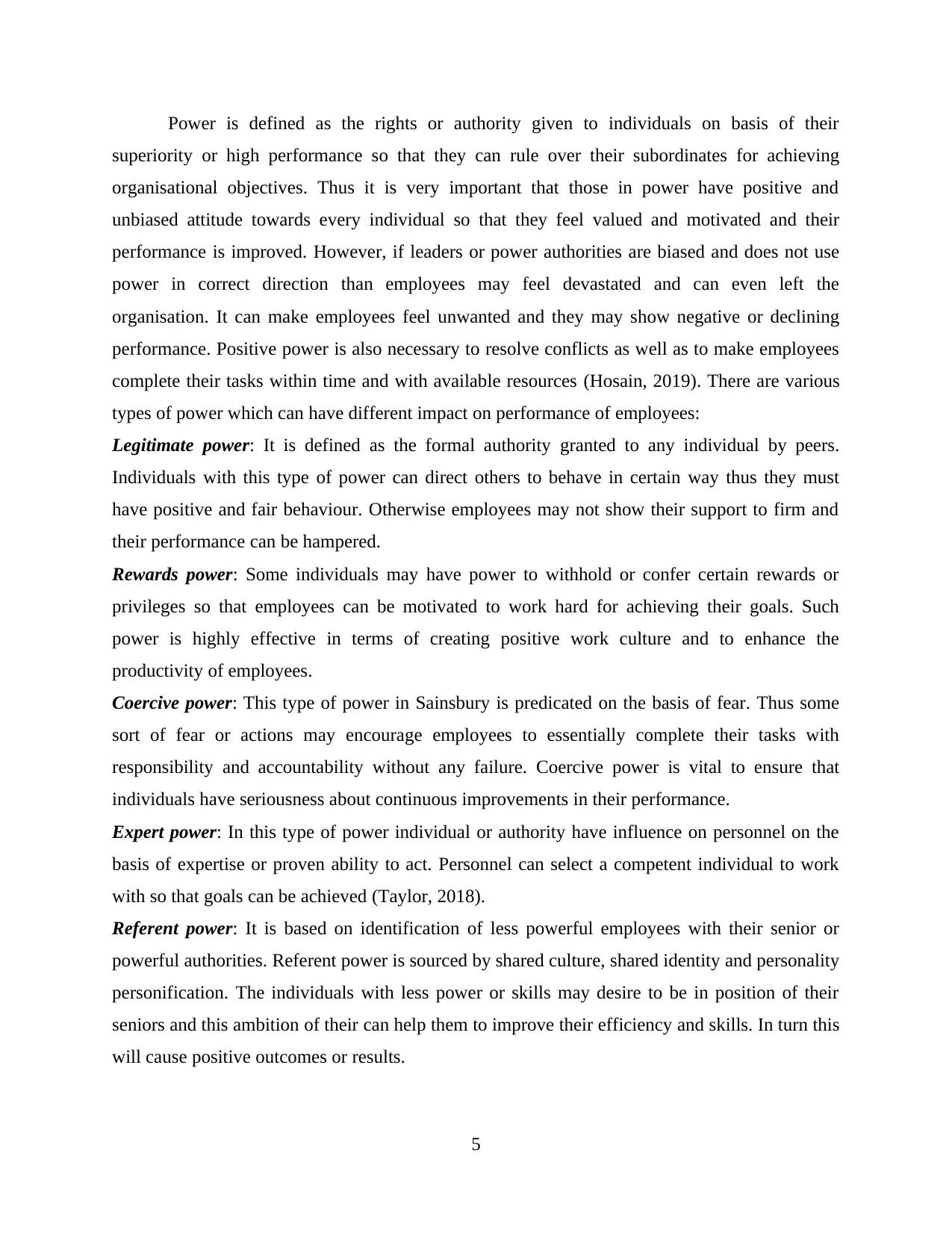
Power is defined as the rights or authority given to individuals on basis of their
superiority or high performance so that they can rule over their subordinates for achieving
organisational objectives. Thus it is very important that those in power have positive and
unbiased attitude towards every individual so that they feel valued and motivated and their
performance is improved. However, if leaders or power authorities are biased and does not use
power in correct direction than employees may feel devastated and can even left the
organisation. It can make employees feel unwanted and they may show negative or declining
performance. Positive power is also necessary to resolve conflicts as well as to make employees
complete their tasks within time and with available resources (Hosain, 2019). There are various
types of power which can have different impact on performance of employees:
Legitimate power: It is defined as the formal authority granted to any individual by peers.
Individuals with this type of power can direct others to behave in certain way thus they must
have positive and fair behaviour. Otherwise employees may not show their support to firm and
their performance can be hampered.
Rewards power: Some individuals may have power to withhold or confer certain rewards or
privileges so that employees can be motivated to work hard for achieving their goals. Such
power is highly effective in terms of creating positive work culture and to enhance the
productivity of employees.
Coercive power: This type of power in Sainsbury is predicated on the basis of fear. Thus some
sort of fear or actions may encourage employees to essentially complete their tasks with
responsibility and accountability without any failure. Coercive power is vital to ensure that
individuals have seriousness about continuous improvements in their performance.
Expert power: In this type of power individual or authority have influence on personnel on the
basis of expertise or proven ability to act. Personnel can select a competent individual to work
with so that goals can be achieved (Taylor, 2018).
Referent power: It is based on identification of less powerful employees with their senior or
powerful authorities. Referent power is sourced by shared culture, shared identity and personality
personification. The individuals with less power or skills may desire to be in position of their
seniors and this ambition of their can help them to improve their efficiency and skills. In turn this
will cause positive outcomes or results.
5
superiority or high performance so that they can rule over their subordinates for achieving
organisational objectives. Thus it is very important that those in power have positive and
unbiased attitude towards every individual so that they feel valued and motivated and their
performance is improved. However, if leaders or power authorities are biased and does not use
power in correct direction than employees may feel devastated and can even left the
organisation. It can make employees feel unwanted and they may show negative or declining
performance. Positive power is also necessary to resolve conflicts as well as to make employees
complete their tasks within time and with available resources (Hosain, 2019). There are various
types of power which can have different impact on performance of employees:
Legitimate power: It is defined as the formal authority granted to any individual by peers.
Individuals with this type of power can direct others to behave in certain way thus they must
have positive and fair behaviour. Otherwise employees may not show their support to firm and
their performance can be hampered.
Rewards power: Some individuals may have power to withhold or confer certain rewards or
privileges so that employees can be motivated to work hard for achieving their goals. Such
power is highly effective in terms of creating positive work culture and to enhance the
productivity of employees.
Coercive power: This type of power in Sainsbury is predicated on the basis of fear. Thus some
sort of fear or actions may encourage employees to essentially complete their tasks with
responsibility and accountability without any failure. Coercive power is vital to ensure that
individuals have seriousness about continuous improvements in their performance.
Expert power: In this type of power individual or authority have influence on personnel on the
basis of expertise or proven ability to act. Personnel can select a competent individual to work
with so that goals can be achieved (Taylor, 2018).
Referent power: It is based on identification of less powerful employees with their senior or
powerful authorities. Referent power is sourced by shared culture, shared identity and personality
personification. The individuals with less power or skills may desire to be in position of their
seniors and this ambition of their can help them to improve their efficiency and skills. In turn this
will cause positive outcomes or results.
5
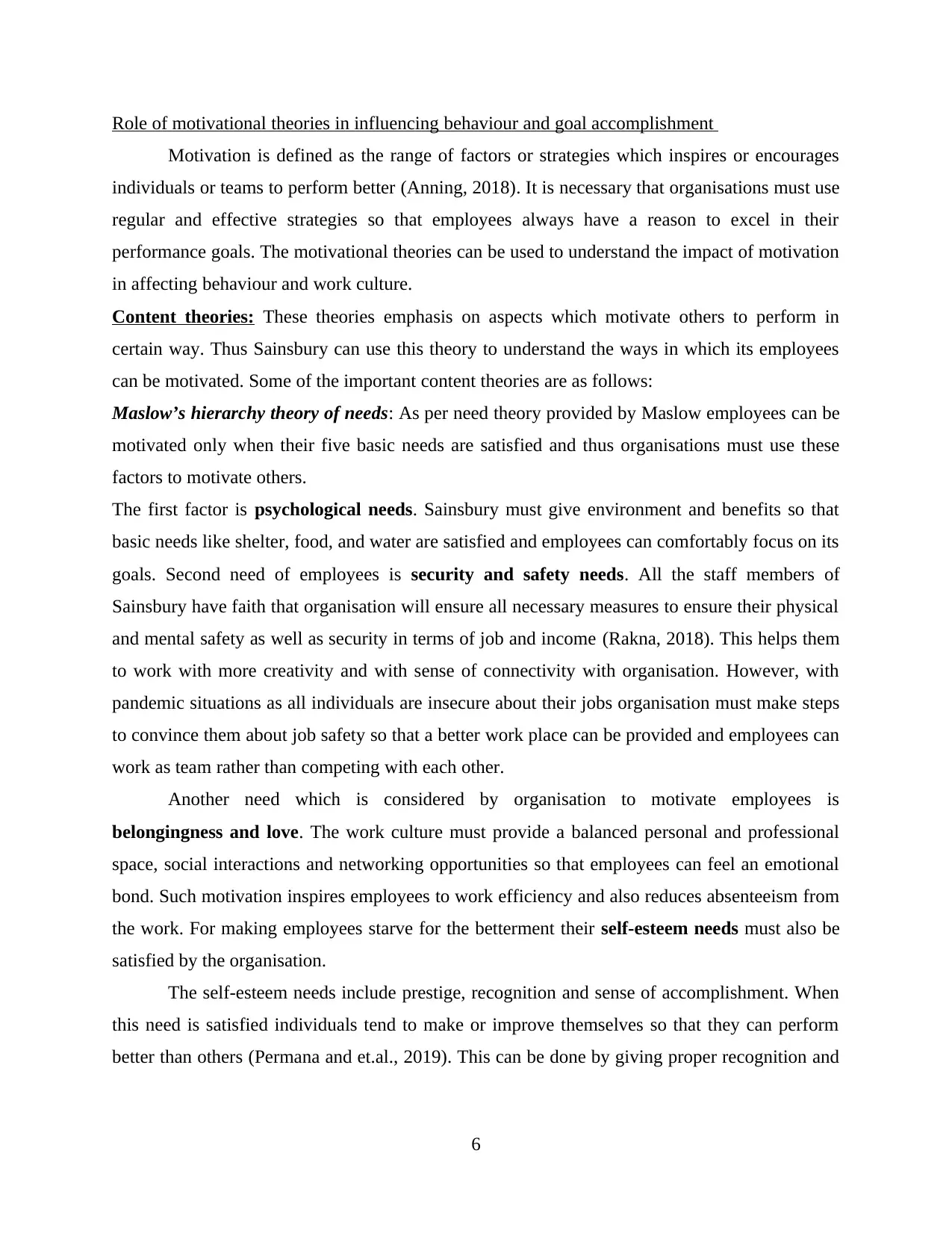
Role of motivational theories in influencing behaviour and goal accomplishment
Motivation is defined as the range of factors or strategies which inspires or encourages
individuals or teams to perform better (Anning, 2018). It is necessary that organisations must use
regular and effective strategies so that employees always have a reason to excel in their
performance goals. The motivational theories can be used to understand the impact of motivation
in affecting behaviour and work culture.
Content theories: These theories emphasis on aspects which motivate others to perform in
certain way. Thus Sainsbury can use this theory to understand the ways in which its employees
can be motivated. Some of the important content theories are as follows:
Maslow’s hierarchy theory of needs: As per need theory provided by Maslow employees can be
motivated only when their five basic needs are satisfied and thus organisations must use these
factors to motivate others.
The first factor is psychological needs. Sainsbury must give environment and benefits so that
basic needs like shelter, food, and water are satisfied and employees can comfortably focus on its
goals. Second need of employees is security and safety needs. All the staff members of
Sainsbury have faith that organisation will ensure all necessary measures to ensure their physical
and mental safety as well as security in terms of job and income (Rakna, 2018). This helps them
to work with more creativity and with sense of connectivity with organisation. However, with
pandemic situations as all individuals are insecure about their jobs organisation must make steps
to convince them about job safety so that a better work place can be provided and employees can
work as team rather than competing with each other.
Another need which is considered by organisation to motivate employees is
belongingness and love. The work culture must provide a balanced personal and professional
space, social interactions and networking opportunities so that employees can feel an emotional
bond. Such motivation inspires employees to work efficiency and also reduces absenteeism from
the work. For making employees starve for the betterment their self-esteem needs must also be
satisfied by the organisation.
The self-esteem needs include prestige, recognition and sense of accomplishment. When
this need is satisfied individuals tend to make or improve themselves so that they can perform
better than others (Permana and et.al., 2019). This can be done by giving proper recognition and
6
Motivation is defined as the range of factors or strategies which inspires or encourages
individuals or teams to perform better (Anning, 2018). It is necessary that organisations must use
regular and effective strategies so that employees always have a reason to excel in their
performance goals. The motivational theories can be used to understand the impact of motivation
in affecting behaviour and work culture.
Content theories: These theories emphasis on aspects which motivate others to perform in
certain way. Thus Sainsbury can use this theory to understand the ways in which its employees
can be motivated. Some of the important content theories are as follows:
Maslow’s hierarchy theory of needs: As per need theory provided by Maslow employees can be
motivated only when their five basic needs are satisfied and thus organisations must use these
factors to motivate others.
The first factor is psychological needs. Sainsbury must give environment and benefits so that
basic needs like shelter, food, and water are satisfied and employees can comfortably focus on its
goals. Second need of employees is security and safety needs. All the staff members of
Sainsbury have faith that organisation will ensure all necessary measures to ensure their physical
and mental safety as well as security in terms of job and income (Rakna, 2018). This helps them
to work with more creativity and with sense of connectivity with organisation. However, with
pandemic situations as all individuals are insecure about their jobs organisation must make steps
to convince them about job safety so that a better work place can be provided and employees can
work as team rather than competing with each other.
Another need which is considered by organisation to motivate employees is
belongingness and love. The work culture must provide a balanced personal and professional
space, social interactions and networking opportunities so that employees can feel an emotional
bond. Such motivation inspires employees to work efficiency and also reduces absenteeism from
the work. For making employees starve for the betterment their self-esteem needs must also be
satisfied by the organisation.
The self-esteem needs include prestige, recognition and sense of accomplishment. When
this need is satisfied individuals tend to make or improve themselves so that they can perform
better than others (Permana and et.al., 2019). This can be done by giving proper recognition and
6
⊘ This is a preview!⊘
Do you want full access?
Subscribe today to unlock all pages.

Trusted by 1+ million students worldwide
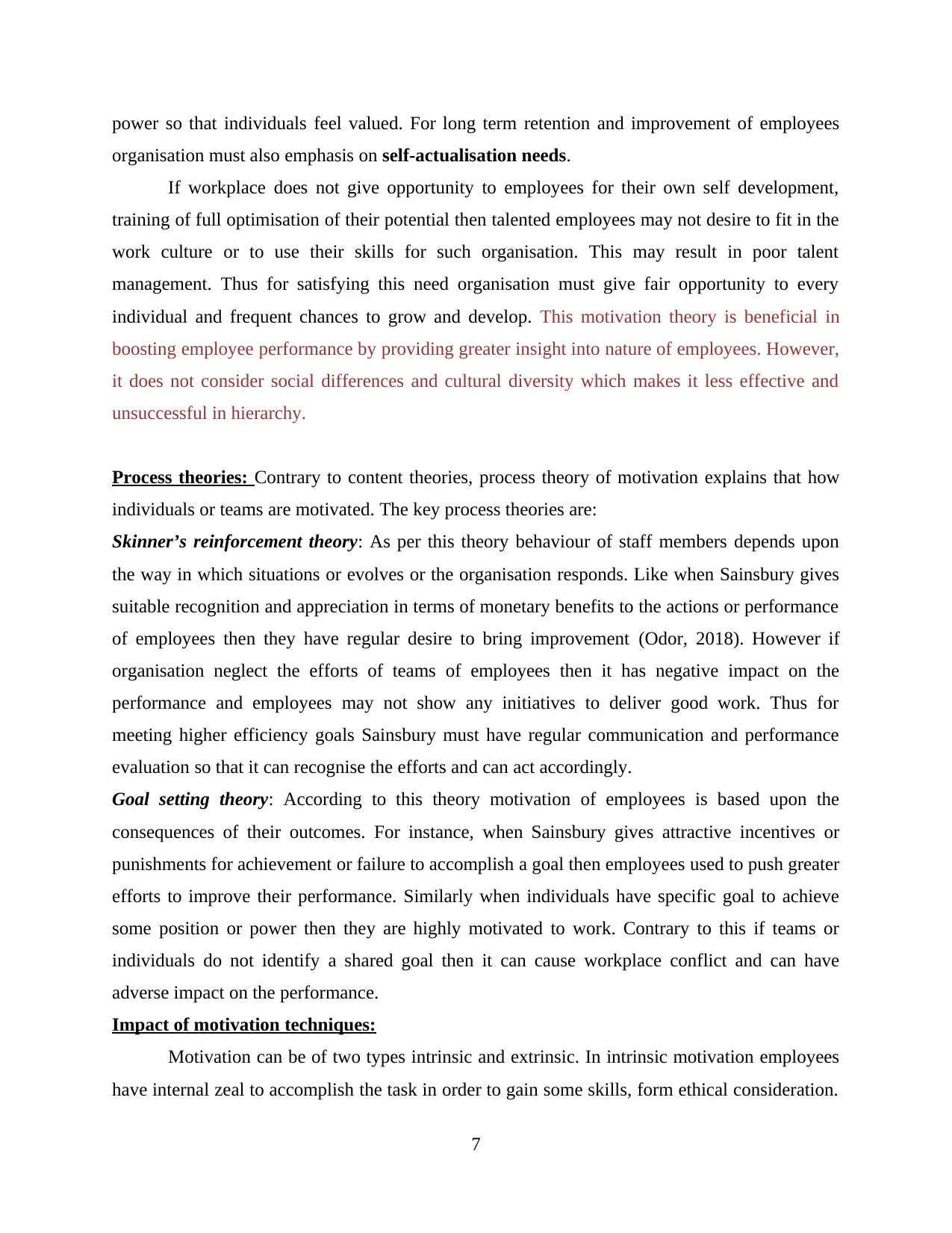
power so that individuals feel valued. For long term retention and improvement of employees
organisation must also emphasis on self-actualisation needs.
If workplace does not give opportunity to employees for their own self development,
training of full optimisation of their potential then talented employees may not desire to fit in the
work culture or to use their skills for such organisation. This may result in poor talent
management. Thus for satisfying this need organisation must give fair opportunity to every
individual and frequent chances to grow and develop. This motivation theory is beneficial in
boosting employee performance by providing greater insight into nature of employees. However,
it does not consider social differences and cultural diversity which makes it less effective and
unsuccessful in hierarchy.
Process theories: Contrary to content theories, process theory of motivation explains that how
individuals or teams are motivated. The key process theories are:
Skinner’s reinforcement theory: As per this theory behaviour of staff members depends upon
the way in which situations or evolves or the organisation responds. Like when Sainsbury gives
suitable recognition and appreciation in terms of monetary benefits to the actions or performance
of employees then they have regular desire to bring improvement (Odor, 2018). However if
organisation neglect the efforts of teams of employees then it has negative impact on the
performance and employees may not show any initiatives to deliver good work. Thus for
meeting higher efficiency goals Sainsbury must have regular communication and performance
evaluation so that it can recognise the efforts and can act accordingly.
Goal setting theory: According to this theory motivation of employees is based upon the
consequences of their outcomes. For instance, when Sainsbury gives attractive incentives or
punishments for achievement or failure to accomplish a goal then employees used to push greater
efforts to improve their performance. Similarly when individuals have specific goal to achieve
some position or power then they are highly motivated to work. Contrary to this if teams or
individuals do not identify a shared goal then it can cause workplace conflict and can have
adverse impact on the performance.
Impact of motivation techniques:
Motivation can be of two types intrinsic and extrinsic. In intrinsic motivation employees
have internal zeal to accomplish the task in order to gain some skills, form ethical consideration.
7
organisation must also emphasis on self-actualisation needs.
If workplace does not give opportunity to employees for their own self development,
training of full optimisation of their potential then talented employees may not desire to fit in the
work culture or to use their skills for such organisation. This may result in poor talent
management. Thus for satisfying this need organisation must give fair opportunity to every
individual and frequent chances to grow and develop. This motivation theory is beneficial in
boosting employee performance by providing greater insight into nature of employees. However,
it does not consider social differences and cultural diversity which makes it less effective and
unsuccessful in hierarchy.
Process theories: Contrary to content theories, process theory of motivation explains that how
individuals or teams are motivated. The key process theories are:
Skinner’s reinforcement theory: As per this theory behaviour of staff members depends upon
the way in which situations or evolves or the organisation responds. Like when Sainsbury gives
suitable recognition and appreciation in terms of monetary benefits to the actions or performance
of employees then they have regular desire to bring improvement (Odor, 2018). However if
organisation neglect the efforts of teams of employees then it has negative impact on the
performance and employees may not show any initiatives to deliver good work. Thus for
meeting higher efficiency goals Sainsbury must have regular communication and performance
evaluation so that it can recognise the efforts and can act accordingly.
Goal setting theory: According to this theory motivation of employees is based upon the
consequences of their outcomes. For instance, when Sainsbury gives attractive incentives or
punishments for achievement or failure to accomplish a goal then employees used to push greater
efforts to improve their performance. Similarly when individuals have specific goal to achieve
some position or power then they are highly motivated to work. Contrary to this if teams or
individuals do not identify a shared goal then it can cause workplace conflict and can have
adverse impact on the performance.
Impact of motivation techniques:
Motivation can be of two types intrinsic and extrinsic. In intrinsic motivation employees
have internal zeal to accomplish the task in order to gain some skills, form ethical consideration.
7
Paraphrase This Document
Need a fresh take? Get an instant paraphrase of this document with our AI Paraphraser
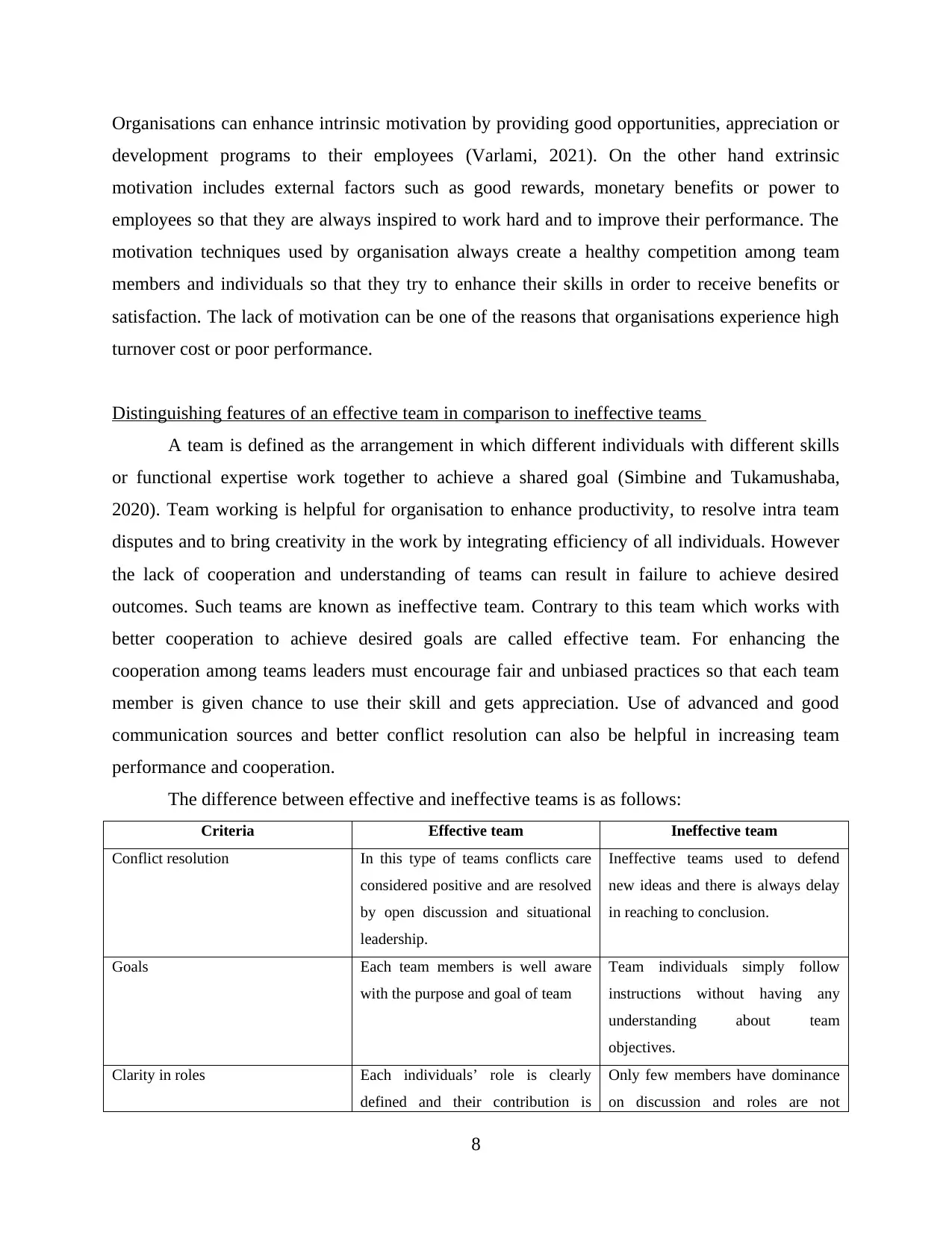
Organisations can enhance intrinsic motivation by providing good opportunities, appreciation or
development programs to their employees (Varlami, 2021). On the other hand extrinsic
motivation includes external factors such as good rewards, monetary benefits or power to
employees so that they are always inspired to work hard and to improve their performance. The
motivation techniques used by organisation always create a healthy competition among team
members and individuals so that they try to enhance their skills in order to receive benefits or
satisfaction. The lack of motivation can be one of the reasons that organisations experience high
turnover cost or poor performance.
Distinguishing features of an effective team in comparison to ineffective teams
A team is defined as the arrangement in which different individuals with different skills
or functional expertise work together to achieve a shared goal (Simbine and Tukamushaba,
2020). Team working is helpful for organisation to enhance productivity, to resolve intra team
disputes and to bring creativity in the work by integrating efficiency of all individuals. However
the lack of cooperation and understanding of teams can result in failure to achieve desired
outcomes. Such teams are known as ineffective team. Contrary to this team which works with
better cooperation to achieve desired goals are called effective team. For enhancing the
cooperation among teams leaders must encourage fair and unbiased practices so that each team
member is given chance to use their skill and gets appreciation. Use of advanced and good
communication sources and better conflict resolution can also be helpful in increasing team
performance and cooperation.
The difference between effective and ineffective teams is as follows:
Criteria Effective team Ineffective team
Conflict resolution In this type of teams conflicts care
considered positive and are resolved
by open discussion and situational
leadership.
Ineffective teams used to defend
new ideas and there is always delay
in reaching to conclusion.
Goals Each team members is well aware
with the purpose and goal of team
Team individuals simply follow
instructions without having any
understanding about team
objectives.
Clarity in roles Each individuals’ role is clearly
defined and their contribution is
Only few members have dominance
on discussion and roles are not
8
development programs to their employees (Varlami, 2021). On the other hand extrinsic
motivation includes external factors such as good rewards, monetary benefits or power to
employees so that they are always inspired to work hard and to improve their performance. The
motivation techniques used by organisation always create a healthy competition among team
members and individuals so that they try to enhance their skills in order to receive benefits or
satisfaction. The lack of motivation can be one of the reasons that organisations experience high
turnover cost or poor performance.
Distinguishing features of an effective team in comparison to ineffective teams
A team is defined as the arrangement in which different individuals with different skills
or functional expertise work together to achieve a shared goal (Simbine and Tukamushaba,
2020). Team working is helpful for organisation to enhance productivity, to resolve intra team
disputes and to bring creativity in the work by integrating efficiency of all individuals. However
the lack of cooperation and understanding of teams can result in failure to achieve desired
outcomes. Such teams are known as ineffective team. Contrary to this team which works with
better cooperation to achieve desired goals are called effective team. For enhancing the
cooperation among teams leaders must encourage fair and unbiased practices so that each team
member is given chance to use their skill and gets appreciation. Use of advanced and good
communication sources and better conflict resolution can also be helpful in increasing team
performance and cooperation.
The difference between effective and ineffective teams is as follows:
Criteria Effective team Ineffective team
Conflict resolution In this type of teams conflicts care
considered positive and are resolved
by open discussion and situational
leadership.
Ineffective teams used to defend
new ideas and there is always delay
in reaching to conclusion.
Goals Each team members is well aware
with the purpose and goal of team
Team individuals simply follow
instructions without having any
understanding about team
objectives.
Clarity in roles Each individuals’ role is clearly
defined and their contribution is
Only few members have dominance
on discussion and roles are not
8
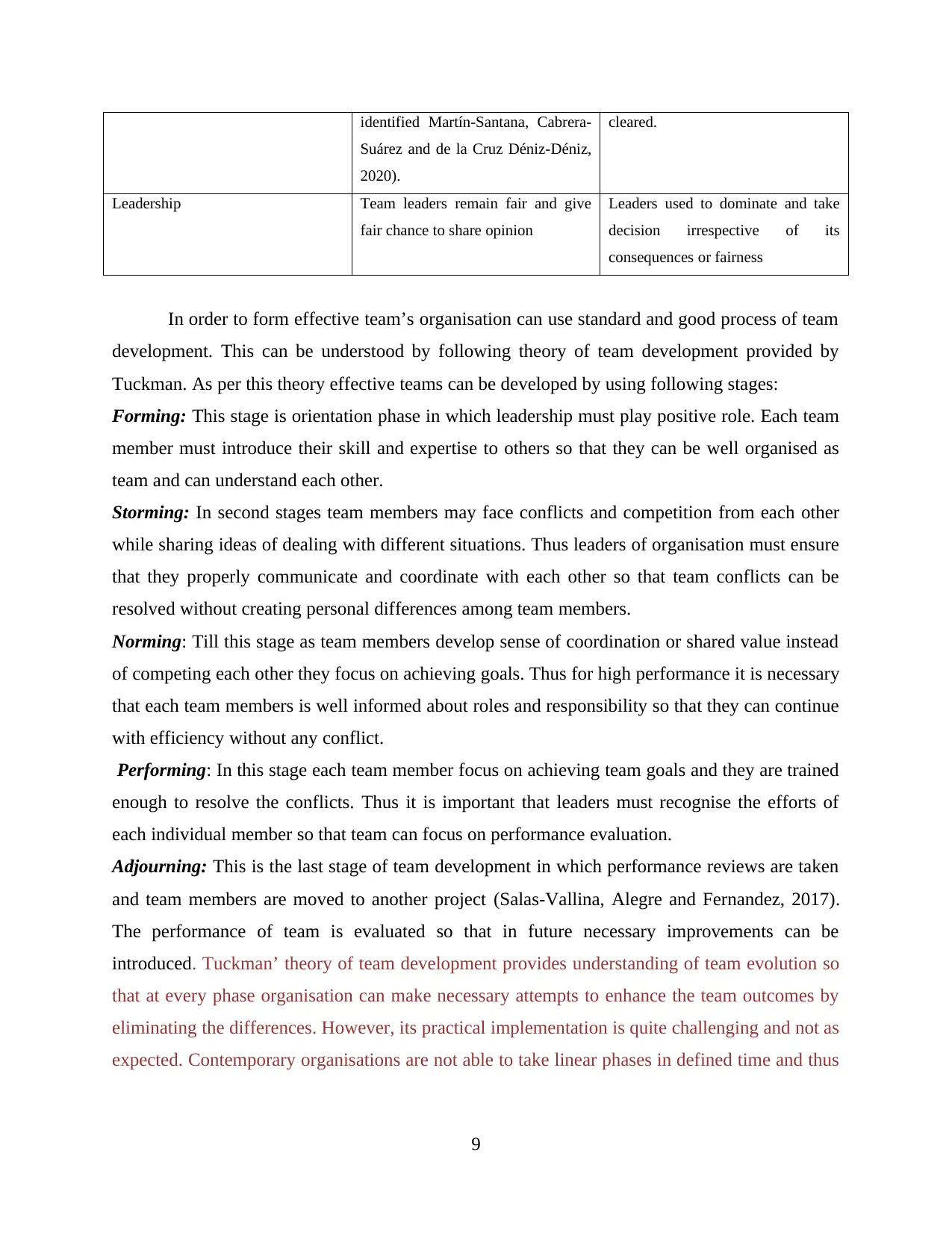
identified Martín-Santana, Cabrera-
Suárez and de la Cruz Déniz-Déniz,
2020).
cleared.
Leadership Team leaders remain fair and give
fair chance to share opinion
Leaders used to dominate and take
decision irrespective of its
consequences or fairness
In order to form effective team’s organisation can use standard and good process of team
development. This can be understood by following theory of team development provided by
Tuckman. As per this theory effective teams can be developed by using following stages:
Forming: This stage is orientation phase in which leadership must play positive role. Each team
member must introduce their skill and expertise to others so that they can be well organised as
team and can understand each other.
Storming: In second stages team members may face conflicts and competition from each other
while sharing ideas of dealing with different situations. Thus leaders of organisation must ensure
that they properly communicate and coordinate with each other so that team conflicts can be
resolved without creating personal differences among team members.
Norming: Till this stage as team members develop sense of coordination or shared value instead
of competing each other they focus on achieving goals. Thus for high performance it is necessary
that each team members is well informed about roles and responsibility so that they can continue
with efficiency without any conflict.
Performing: In this stage each team member focus on achieving team goals and they are trained
enough to resolve the conflicts. Thus it is important that leaders must recognise the efforts of
each individual member so that team can focus on performance evaluation.
Adjourning: This is the last stage of team development in which performance reviews are taken
and team members are moved to another project (Salas-Vallina, Alegre and Fernandez, 2017).
The performance of team is evaluated so that in future necessary improvements can be
introduced. Tuckman’ theory of team development provides understanding of team evolution so
that at every phase organisation can make necessary attempts to enhance the team outcomes by
eliminating the differences. However, its practical implementation is quite challenging and not as
expected. Contemporary organisations are not able to take linear phases in defined time and thus
9
Suárez and de la Cruz Déniz-Déniz,
2020).
cleared.
Leadership Team leaders remain fair and give
fair chance to share opinion
Leaders used to dominate and take
decision irrespective of its
consequences or fairness
In order to form effective team’s organisation can use standard and good process of team
development. This can be understood by following theory of team development provided by
Tuckman. As per this theory effective teams can be developed by using following stages:
Forming: This stage is orientation phase in which leadership must play positive role. Each team
member must introduce their skill and expertise to others so that they can be well organised as
team and can understand each other.
Storming: In second stages team members may face conflicts and competition from each other
while sharing ideas of dealing with different situations. Thus leaders of organisation must ensure
that they properly communicate and coordinate with each other so that team conflicts can be
resolved without creating personal differences among team members.
Norming: Till this stage as team members develop sense of coordination or shared value instead
of competing each other they focus on achieving goals. Thus for high performance it is necessary
that each team members is well informed about roles and responsibility so that they can continue
with efficiency without any conflict.
Performing: In this stage each team member focus on achieving team goals and they are trained
enough to resolve the conflicts. Thus it is important that leaders must recognise the efforts of
each individual member so that team can focus on performance evaluation.
Adjourning: This is the last stage of team development in which performance reviews are taken
and team members are moved to another project (Salas-Vallina, Alegre and Fernandez, 2017).
The performance of team is evaluated so that in future necessary improvements can be
introduced. Tuckman’ theory of team development provides understanding of team evolution so
that at every phase organisation can make necessary attempts to enhance the team outcomes by
eliminating the differences. However, its practical implementation is quite challenging and not as
expected. Contemporary organisations are not able to take linear phases in defined time and thus
9
⊘ This is a preview!⊘
Do you want full access?
Subscribe today to unlock all pages.

Trusted by 1+ million students worldwide
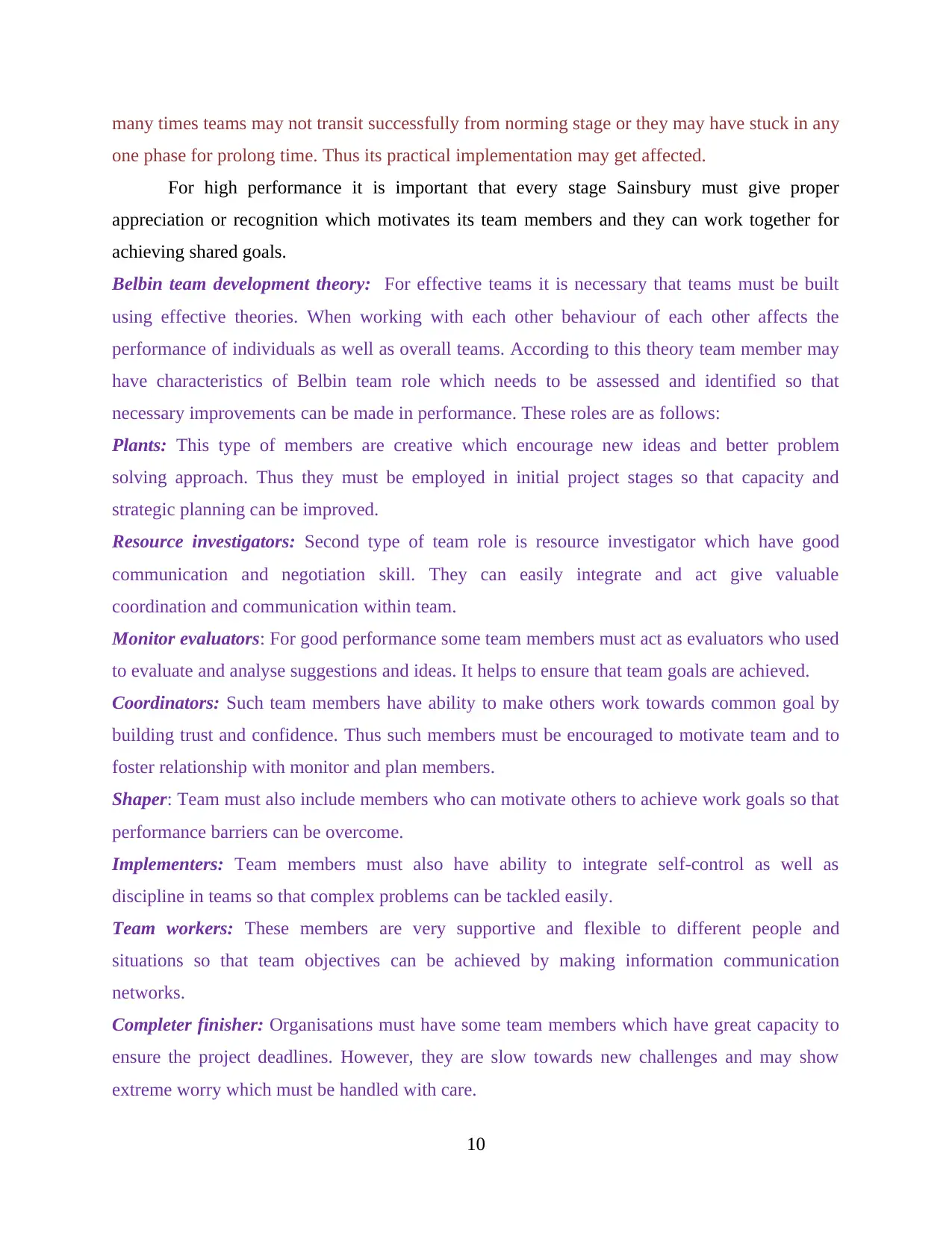
many times teams may not transit successfully from norming stage or they may have stuck in any
one phase for prolong time. Thus its practical implementation may get affected.
For high performance it is important that every stage Sainsbury must give proper
appreciation or recognition which motivates its team members and they can work together for
achieving shared goals.
Belbin team development theory: For effective teams it is necessary that teams must be built
using effective theories. When working with each other behaviour of each other affects the
performance of individuals as well as overall teams. According to this theory team member may
have characteristics of Belbin team role which needs to be assessed and identified so that
necessary improvements can be made in performance. These roles are as follows:
Plants: This type of members are creative which encourage new ideas and better problem
solving approach. Thus they must be employed in initial project stages so that capacity and
strategic planning can be improved.
Resource investigators: Second type of team role is resource investigator which have good
communication and negotiation skill. They can easily integrate and act give valuable
coordination and communication within team.
Monitor evaluators: For good performance some team members must act as evaluators who used
to evaluate and analyse suggestions and ideas. It helps to ensure that team goals are achieved.
Coordinators: Such team members have ability to make others work towards common goal by
building trust and confidence. Thus such members must be encouraged to motivate team and to
foster relationship with monitor and plan members.
Shaper: Team must also include members who can motivate others to achieve work goals so that
performance barriers can be overcome.
Implementers: Team members must also have ability to integrate self-control as well as
discipline in teams so that complex problems can be tackled easily.
Team workers: These members are very supportive and flexible to different people and
situations so that team objectives can be achieved by making information communication
networks.
Completer finisher: Organisations must have some team members which have great capacity to
ensure the project deadlines. However, they are slow towards new challenges and may show
extreme worry which must be handled with care.
10
one phase for prolong time. Thus its practical implementation may get affected.
For high performance it is important that every stage Sainsbury must give proper
appreciation or recognition which motivates its team members and they can work together for
achieving shared goals.
Belbin team development theory: For effective teams it is necessary that teams must be built
using effective theories. When working with each other behaviour of each other affects the
performance of individuals as well as overall teams. According to this theory team member may
have characteristics of Belbin team role which needs to be assessed and identified so that
necessary improvements can be made in performance. These roles are as follows:
Plants: This type of members are creative which encourage new ideas and better problem
solving approach. Thus they must be employed in initial project stages so that capacity and
strategic planning can be improved.
Resource investigators: Second type of team role is resource investigator which have good
communication and negotiation skill. They can easily integrate and act give valuable
coordination and communication within team.
Monitor evaluators: For good performance some team members must act as evaluators who used
to evaluate and analyse suggestions and ideas. It helps to ensure that team goals are achieved.
Coordinators: Such team members have ability to make others work towards common goal by
building trust and confidence. Thus such members must be encouraged to motivate team and to
foster relationship with monitor and plan members.
Shaper: Team must also include members who can motivate others to achieve work goals so that
performance barriers can be overcome.
Implementers: Team members must also have ability to integrate self-control as well as
discipline in teams so that complex problems can be tackled easily.
Team workers: These members are very supportive and flexible to different people and
situations so that team objectives can be achieved by making information communication
networks.
Completer finisher: Organisations must have some team members which have great capacity to
ensure the project deadlines. However, they are slow towards new challenges and may show
extreme worry which must be handled with care.
10
Paraphrase This Document
Need a fresh take? Get an instant paraphrase of this document with our AI Paraphraser
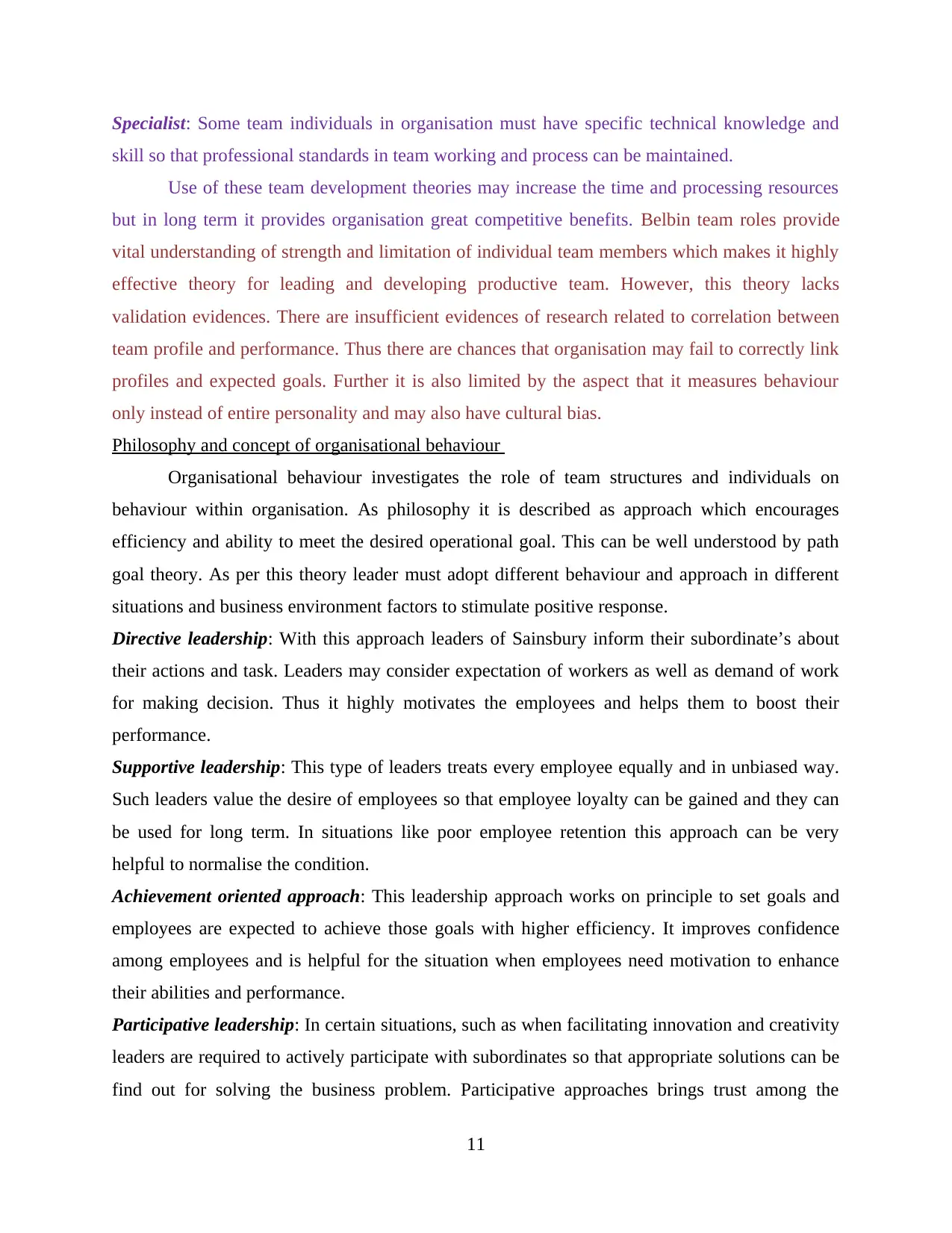
Specialist: Some team individuals in organisation must have specific technical knowledge and
skill so that professional standards in team working and process can be maintained.
Use of these team development theories may increase the time and processing resources
but in long term it provides organisation great competitive benefits. Belbin team roles provide
vital understanding of strength and limitation of individual team members which makes it highly
effective theory for leading and developing productive team. However, this theory lacks
validation evidences. There are insufficient evidences of research related to correlation between
team profile and performance. Thus there are chances that organisation may fail to correctly link
profiles and expected goals. Further it is also limited by the aspect that it measures behaviour
only instead of entire personality and may also have cultural bias.
Philosophy and concept of organisational behaviour
Organisational behaviour investigates the role of team structures and individuals on
behaviour within organisation. As philosophy it is described as approach which encourages
efficiency and ability to meet the desired operational goal. This can be well understood by path
goal theory. As per this theory leader must adopt different behaviour and approach in different
situations and business environment factors to stimulate positive response.
Directive leadership: With this approach leaders of Sainsbury inform their subordinate’s about
their actions and task. Leaders may consider expectation of workers as well as demand of work
for making decision. Thus it highly motivates the employees and helps them to boost their
performance.
Supportive leadership: This type of leaders treats every employee equally and in unbiased way.
Such leaders value the desire of employees so that employee loyalty can be gained and they can
be used for long term. In situations like poor employee retention this approach can be very
helpful to normalise the condition.
Achievement oriented approach: This leadership approach works on principle to set goals and
employees are expected to achieve those goals with higher efficiency. It improves confidence
among employees and is helpful for the situation when employees need motivation to enhance
their abilities and performance.
Participative leadership: In certain situations, such as when facilitating innovation and creativity
leaders are required to actively participate with subordinates so that appropriate solutions can be
find out for solving the business problem. Participative approaches brings trust among the
11
skill so that professional standards in team working and process can be maintained.
Use of these team development theories may increase the time and processing resources
but in long term it provides organisation great competitive benefits. Belbin team roles provide
vital understanding of strength and limitation of individual team members which makes it highly
effective theory for leading and developing productive team. However, this theory lacks
validation evidences. There are insufficient evidences of research related to correlation between
team profile and performance. Thus there are chances that organisation may fail to correctly link
profiles and expected goals. Further it is also limited by the aspect that it measures behaviour
only instead of entire personality and may also have cultural bias.
Philosophy and concept of organisational behaviour
Organisational behaviour investigates the role of team structures and individuals on
behaviour within organisation. As philosophy it is described as approach which encourages
efficiency and ability to meet the desired operational goal. This can be well understood by path
goal theory. As per this theory leader must adopt different behaviour and approach in different
situations and business environment factors to stimulate positive response.
Directive leadership: With this approach leaders of Sainsbury inform their subordinate’s about
their actions and task. Leaders may consider expectation of workers as well as demand of work
for making decision. Thus it highly motivates the employees and helps them to boost their
performance.
Supportive leadership: This type of leaders treats every employee equally and in unbiased way.
Such leaders value the desire of employees so that employee loyalty can be gained and they can
be used for long term. In situations like poor employee retention this approach can be very
helpful to normalise the condition.
Achievement oriented approach: This leadership approach works on principle to set goals and
employees are expected to achieve those goals with higher efficiency. It improves confidence
among employees and is helpful for the situation when employees need motivation to enhance
their abilities and performance.
Participative leadership: In certain situations, such as when facilitating innovation and creativity
leaders are required to actively participate with subordinates so that appropriate solutions can be
find out for solving the business problem. Participative approaches brings trust among the
11
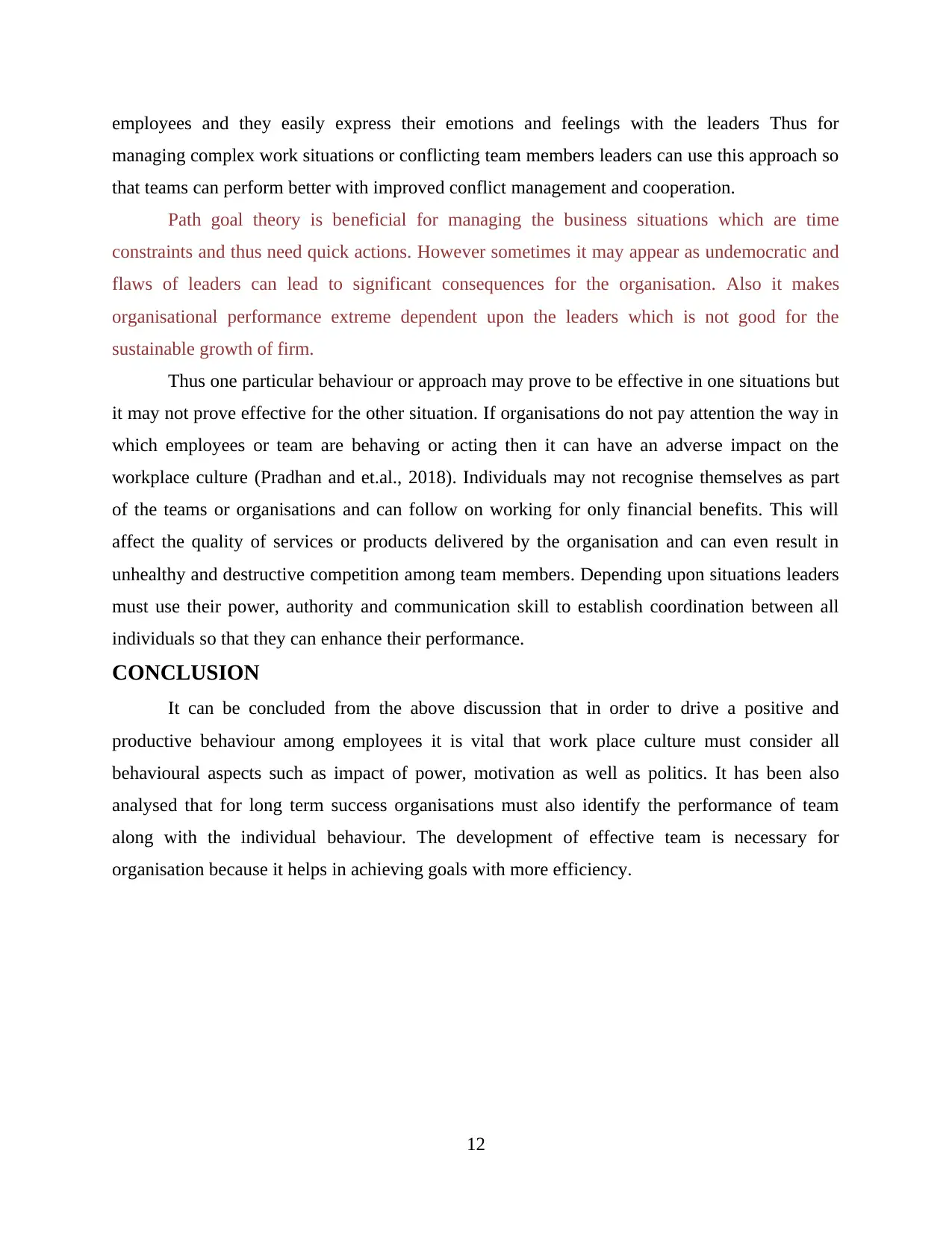
employees and they easily express their emotions and feelings with the leaders Thus for
managing complex work situations or conflicting team members leaders can use this approach so
that teams can perform better with improved conflict management and cooperation.
Path goal theory is beneficial for managing the business situations which are time
constraints and thus need quick actions. However sometimes it may appear as undemocratic and
flaws of leaders can lead to significant consequences for the organisation. Also it makes
organisational performance extreme dependent upon the leaders which is not good for the
sustainable growth of firm.
Thus one particular behaviour or approach may prove to be effective in one situations but
it may not prove effective for the other situation. If organisations do not pay attention the way in
which employees or team are behaving or acting then it can have an adverse impact on the
workplace culture (Pradhan and et.al., 2018). Individuals may not recognise themselves as part
of the teams or organisations and can follow on working for only financial benefits. This will
affect the quality of services or products delivered by the organisation and can even result in
unhealthy and destructive competition among team members. Depending upon situations leaders
must use their power, authority and communication skill to establish coordination between all
individuals so that they can enhance their performance.
CONCLUSION
It can be concluded from the above discussion that in order to drive a positive and
productive behaviour among employees it is vital that work place culture must consider all
behavioural aspects such as impact of power, motivation as well as politics. It has been also
analysed that for long term success organisations must also identify the performance of team
along with the individual behaviour. The development of effective team is necessary for
organisation because it helps in achieving goals with more efficiency.
12
managing complex work situations or conflicting team members leaders can use this approach so
that teams can perform better with improved conflict management and cooperation.
Path goal theory is beneficial for managing the business situations which are time
constraints and thus need quick actions. However sometimes it may appear as undemocratic and
flaws of leaders can lead to significant consequences for the organisation. Also it makes
organisational performance extreme dependent upon the leaders which is not good for the
sustainable growth of firm.
Thus one particular behaviour or approach may prove to be effective in one situations but
it may not prove effective for the other situation. If organisations do not pay attention the way in
which employees or team are behaving or acting then it can have an adverse impact on the
workplace culture (Pradhan and et.al., 2018). Individuals may not recognise themselves as part
of the teams or organisations and can follow on working for only financial benefits. This will
affect the quality of services or products delivered by the organisation and can even result in
unhealthy and destructive competition among team members. Depending upon situations leaders
must use their power, authority and communication skill to establish coordination between all
individuals so that they can enhance their performance.
CONCLUSION
It can be concluded from the above discussion that in order to drive a positive and
productive behaviour among employees it is vital that work place culture must consider all
behavioural aspects such as impact of power, motivation as well as politics. It has been also
analysed that for long term success organisations must also identify the performance of team
along with the individual behaviour. The development of effective team is necessary for
organisation because it helps in achieving goals with more efficiency.
12
⊘ This is a preview!⊘
Do you want full access?
Subscribe today to unlock all pages.

Trusted by 1+ million students worldwide
1 out of 13
Related Documents
Your All-in-One AI-Powered Toolkit for Academic Success.
+13062052269
info@desklib.com
Available 24*7 on WhatsApp / Email
![[object Object]](/_next/static/media/star-bottom.7253800d.svg)
Unlock your academic potential
Copyright © 2020–2026 A2Z Services. All Rights Reserved. Developed and managed by ZUCOL.





